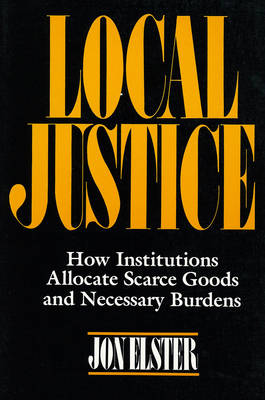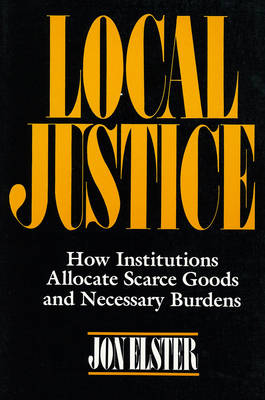
Bedankt voor het vertrouwen het afgelopen jaar! Om jou te bedanken bieden we GRATIS verzending (in België) aan op alles gedurende de hele maand januari.
- Afhalen na 1 uur in een winkel met voorraad
- In januari gratis thuislevering in België
- Ruim aanbod met 7 miljoen producten
Bedankt voor het vertrouwen het afgelopen jaar! Om jou te bedanken bieden we GRATIS verzending (in België) aan op alles gedurende de hele maand januari.
- Afhalen na 1 uur in een winkel met voorraad
- In januari gratis thuislevering in België
- Ruim aanbod met 7 miljoen producten
Zoeken
Local Justice
How Institutions Allocate Scarce Goods and Necessary Burdens
Jon Elster
Paperback | Engels
€ 41,45
+ 82 punten
Omschrijving
The well-being of individuals routinely depends on their success in obtaining goods and avoiding burdens distributed by society. Local Justice offers the first systematic analysis of the principles and procedures used in dispensing "local justice" in situations as varied as the admission of students to college, the choice of patients for organ transplants, the selection of workers for layoffs, and the induction of men into the army. A prominent theorist in the field of rational choice and decision making, Jon Elster develops a rich selection of empirical examples and case studies to demonstrate the diversity of procedures used by institutions that mete out local justice. From this revealing material Elster fashions a conceptual framework for understanding why institutions make these crucial allocations in the ways they do. Elster's investigation discloses the many complex and varied approaches of such decision-making bodies as selective service and adoption agencies, employers and universities, prison and immigration authorities. What are the conflicting demands placed on these institutions by the needs of applicants, the recommendations of external agencies, and their own organizational imperatives? Often, as Elster shows, methods of allocation may actually aggravate social problems. For instance, the likelihood that handicapped or minority infants will be adopted is further decreased when agencies apply the same stringent screening criteria--exclusion of people over forty, single parents, working wives, and low-income families--that they use for more sought-after babies. Elster proposes a classification of the main principles and procedures used to match goods with individuals, charts the interactions among these mechanisms of local justice, and evaluates them in terms of fairness and efficiency. From his empirical groundwork, Elster builds an innovative analysis of the historical processes by which, at given times and under given circumstances, preferences become principles and principles become procedures. Local Justice concludes with a comparison of local justice systems with major contemporary theories of social justice--utilitarianism, John Rawls's A Theory of Justice, Robert Nozick's Anarchy, State, and Utopia--and discusses the "common-sense conception of justice" held by professional decision makers such as lawyers, economists, and politicians. The difference between what we say about justice and how we actually dispense it is the illuminating principle behind Elster's book. A perceptive and cosmopolitan study, Local Justice is a seminal work for all those concerned with the formation of ethical policy and social welfare--philosophers, economists, political scientists, health care professionals, policy makers, and educators.
Specificaties
Betrokkenen
- Auteur(s):
- Uitgeverij:
Inhoud
- Aantal bladzijden:
- 293
- Taal:
- Engels
Eigenschappen
- Productcode (EAN):
- 9780871542328
- Verschijningsdatum:
- 14/12/1993
- Uitvoering:
- Paperback
- Formaat:
- Trade paperback (VS)
- Afmetingen:
- 153 mm x 227 mm
- Gewicht:
- 408 g

Alleen bij Standaard Boekhandel
+ 82 punten op je klantenkaart van Standaard Boekhandel
Beoordelingen
We publiceren alleen reviews die voldoen aan de voorwaarden voor reviews. Bekijk onze voorwaarden voor reviews.









